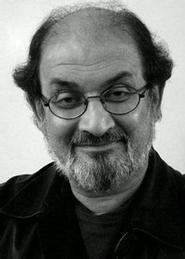
Society's obsession to draw connections between an author's fictional literature and his or her actual life is the "disease" of the current fiction novel, said author Salman Rushdie.
Readers either assume a novel is based on the author's life or try to identify with a fictitious character in the novel, Rushdie told a standing-room-only audience in Wellin Hall during the annual Tolles Lecture on April 13. Although fiction writers do not typically reflect their own life experiences in their work, he acknowledged that what happens to a writer shapes the way he sees the world.
"The desire to write about my life wasn't there [initially]," Rushdie said. As he continued to write, however, he found that his fictionalized characters were becoming more like people in his life, but, "in order to make characters come alive, you have to make them up," he explained.
In his lecture "Step Across This Line," Rushdie described his own creative influences. "Public events influence our private lives. It is impossible to avoid," he said, citing as examples his childhood in Bombay, the "Bombay slang" and the subsequent challenges in writing an essentially non-existent language.
He also explained the significant role organized religion has played in his writing. People of India and Pakistan are devout, and therefore "you cannot tell their story without discussing religion," Rushdie said. Although he never considered himself to be a religious writer, he now sees the growing influence of religion, which could possibly have negative effects; "religion is coming after us all in a way," he warned.
Rushdie also discussed how the events of September 11 influence fictional literature. The tragic events force writers to examine the how the frailty of life effects how they tell the stories of people's lives. If lives can be changed without our control, what does that mean about how writers craft fictionalized stories? "The rules of realism no longer apply to the real world," Rushdie added.
Rushdie, one of the best-known living writers, has published eight novels, a collection of short stories and several works of nonfiction. His most recent book, Step Across This Line: Collected Non-fiction, 1992-2002, explores the reaction of the media, various governments and the writer himself to what he calls the "unfunny Valentine" he received on Feb. 14, 1989, from Iran's Ayatollah Khomeini calling for his death on the grounds of blasphemy against Islam in his novel The Satanic Verses. As a result, Rushdie spent a decade of his life in hiding, protected by British security forces.
He concluded his lecture with a discussion of that experience and the freedom of speech. "Should you be able to kill someone if you don't like their book? The answer is simple: no," Rushdie said.
One thing that we can all learn from this event, Rushdie explained, is that we need to allow controversial opinions to circulate for a long time because ideas can explain themselves over time. "A defense of free speech depends on allowing people to speak in ways you do not agree with," he concluded. "It is when people say things you really object to that you will find if you agree with free speech."
An extensive question-and-answer session followed Rushdie's lecture.
The lecture was sponsored by the Winton J. Tolles lecture fund and hosted by Hamilton's English department. The Tolles Lecture was established in 1991 by members of the Class of 1951 in memory of Winton Tolles, Class of 1928 and dean of the college from 1947-72. It brings to the campus distinguished speakers in the fields of literature, journalism and theater to lecture and meet with students.
--Emily Lemanczyk '05
Posted April 14, 2005
